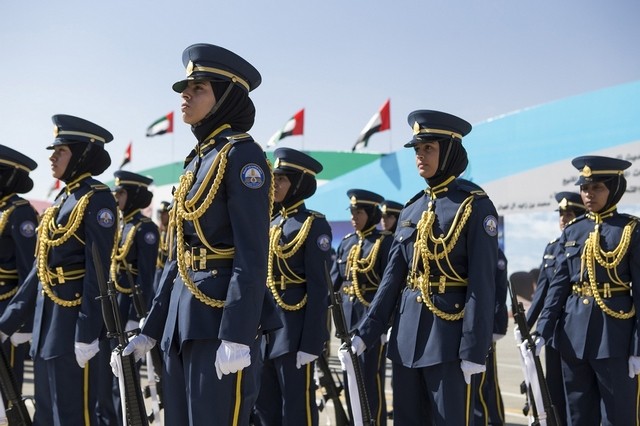Australia can do more to support women’s participation in Middle Eastern militaries

A recent event in the United Arab Emirates sparked both merriment and scorn globally when every award at the Gender Balance Index 2018 was handed to a man. UAE Vice President Sheikh Mohammed bin Rashid Al Maktoum, who presented the awards, may have surprised some observers with this tone-deaf action; he is better known for his more successful gender initiatives, including increasing female representation in diplomatic roles, law and the judiciary.
Kinder commentators said that even the Gender Balance Index fiasco was a step in the right direction, noting that one of the awards was for instituting maternity leave for female UAE soldiers. But is this genuine progress that we should be applauding, or lip service to silence irritating (and largely Western) sniping? And what does it matter to Australia?
The UAE has arguably the most advanced military in the Middle East bar Israel, and Australia can immodestly claim significant credit for that through a combination of long-term government support and a slew of ex-ADF personnel who have worked to professionalise the UAE Armed Forces from the inside. Australia has provided equipment, training and other forms of support to the armed forces of nearly every country in the Middle East at some point, and women, peace and security (WPS) is coming up more and more frequently as an engagement topic.
While our contributions may be small in the scheme of things, Australian support (and equipment) does come with the cachet of high-end professionalism and potentially a sympathetic ear from a member of the Five Eyes community. Australia also gets to burnish its credentials as a champion of WPS. But barriers of language, culture and distance make follow-up difficult, along with a certain level of fatalism that accompanies just about any effort in a region littered with the failures of Western intervention.
One of the greatest challenges is trying to confirm what has actually occurred after the headline statements. Data beyond what governments want released is limited to say the least, especially in English. An internet search will turn up scores of favourable puff pieces, mainly from Arab media or Western sources uncritically repeating them. In 2018, both Saudi Arabia and Qatar announced that they were opening the doors for female volunteers to join their armed forces (although in Saudi Arabia’s case this would still require a male guardian’s permission). There’s little word yet on any further developments, from what types of roles will be open to women, to how many have chosen (or been allowed) to join up. Oman’s public commitments to gender balance in the armed forces seem limited to the Royal Cavalry’s all-female marching band, which doesn’t help dispel the feeling that these announcements are mere window-dressing.
Things in the more progressive Jordanian Armed Forces (JAF) appear better, but again the critiques are limited. The JAF apparently intends to triple its percentage of women over the next five years. That sounds impressive, but the increase is from 1% to 3%, and the options for women will still be limited (and frankly puzzling to a Western audience; a woman in the JAF can become fully trained in midwifery). Unlike many of its far richer neighbours, Jordan has some pressing incentives to meet international norms. It is heavily dependent on external aid and is a sizeable contributor of peacekeepers to the UN.
The question we have to ask ourselves is whether our contributions are helping or hindering. By congratulating the JAF on its female engagement team are we respecting genuine progress in a culturally sensitive situation, or glossing over the doubling in child bride rates among the refugees they are supposed to be protecting? Even the UAE, which opened the Gulf region’s first military college for women in 1991, still requires adult women to seek permission from their guardians before joining. Do we applaud or sigh?
The answer, of course, is that it’s more complex than a simple binary choice. Women in the armed forces of nearly any country face a daunting situation, made harder by complex cultural and societal expectations. Successes should certainly be lauded, but Australia needs to think carefully about what it does next. Rather than simply repeating the latest platitude, Australia should be asking for hard data and honest discussions. There needs to be transparency and accountability, and a cleverer and more nuanced approach to capacity-building efforts that adds to a long-term strategy.
Australia is by no means the only country seeking to support women and gender issues in the Middle East, and should work closely with like-minded countries like the US, UK and Canada to coordinate and align our activities. Most importantly, we should all be sending the same message about ensuring that the countries of the Middle East make some real progress after the press release has been issued. Perhaps then we’ll see a few more awards being handed to women.